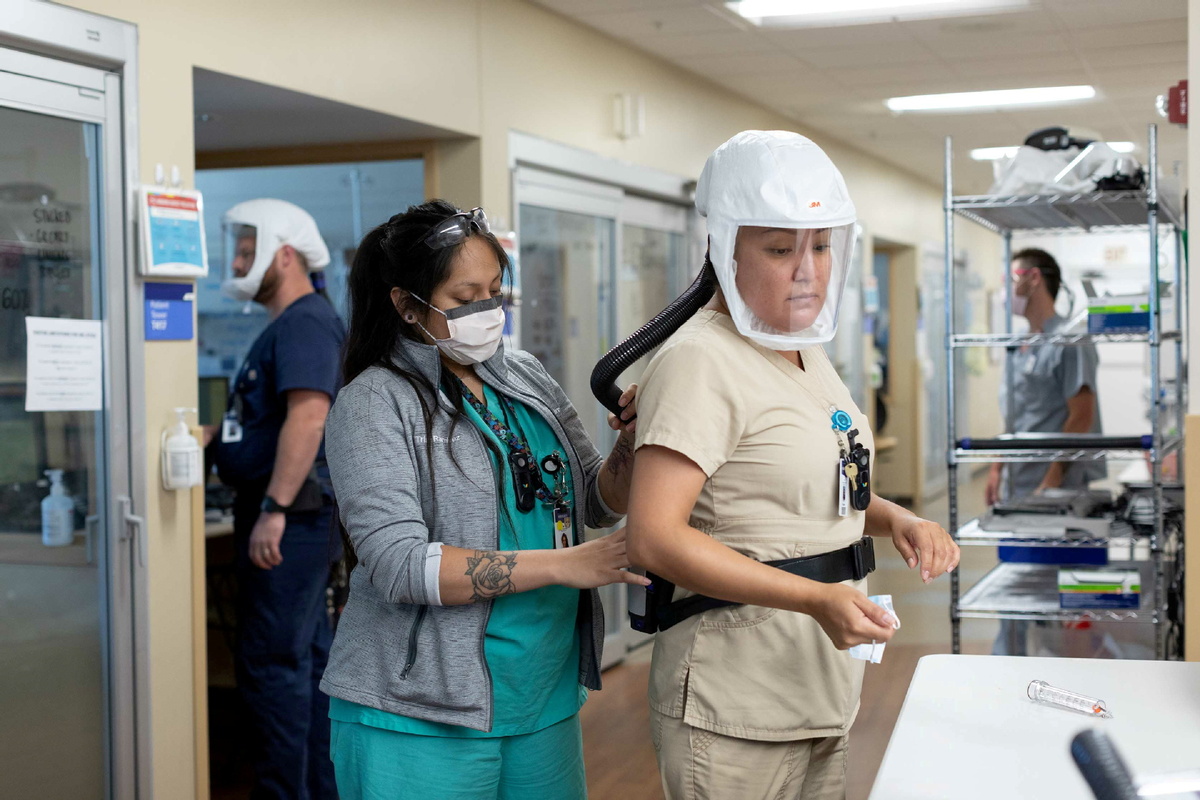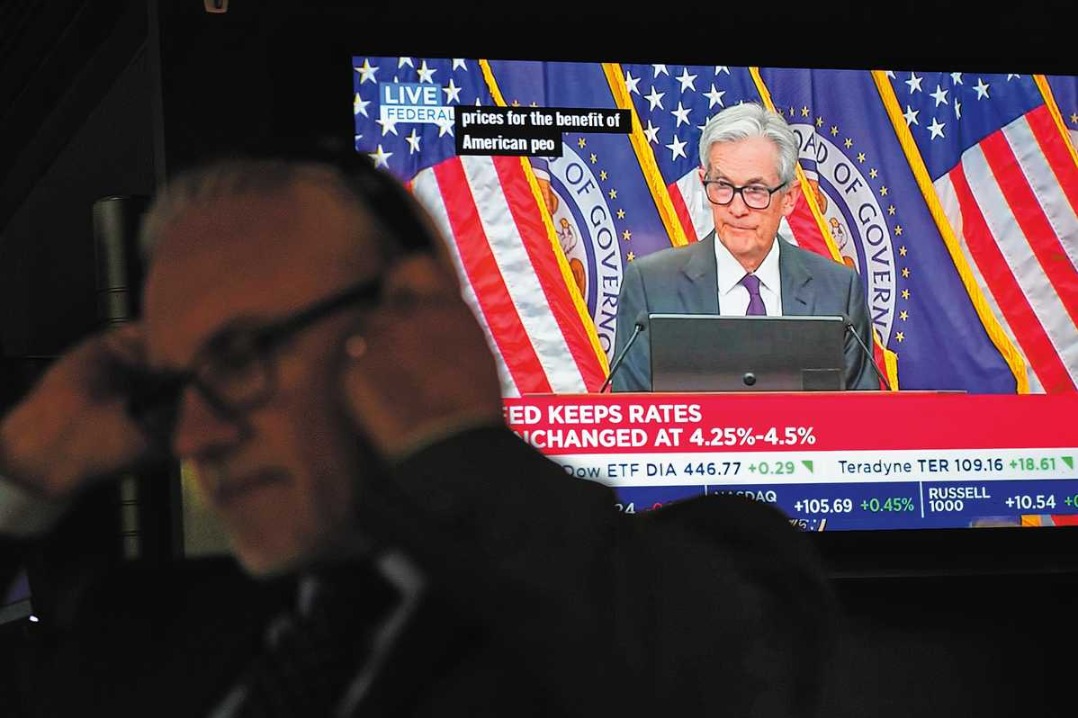Delta variant pushes US coronavirus cases to record


The Delta variant has pushed up US coronavirus infections to averages of about 100,000 a day, federal data show, levels last breached before vaccines were available in the US.
It accounts for about 93 percent of the nation's cases among all of its iterations. according to health officials.
Hospitalizations and deaths have climbed less sharply nationwide, but in some parts of the country where vaccination rates are lower, more people have been hospitalized for COVID-19 than ever.
Florida has had more coronavirus cases than all 30 states with the lowest case rates combined, the White House pandemic response team said at a briefing on Thursday. Florida and Texas alone have accounted for nearly 40 percent of new hospitalizations across the country, the team said.
The two states also have had far more children under 18 hospitalized with COVID-19 in the last week than any other state, according to Centers for Disease Control and Prevention (CDC).
On Thursday, Mississippi reported more than 4,400 newly reported coronavirus cases and 20 deaths. More than 1,500 people in the state are hospitalized, and nearly 400 ICU beds are filled with infected patients. Mississippi is averaging nearly 2,700 new coronavirus infections a day in the past week — a 54 percent spike in the past seven days, according to The Washington Post.
The surge in coronavirus patients and a shortage of healthcare workers and intensive care unit beds have pushed Mississippi's hospital system to the brink of "failure", state health officials warned, saying drastic federal intervention was needed to help the state grapple with the thousands of new daily infections that have overwhelmed doctors and nurses.
Dr Alan Jones, associate vice-chancellor for clinical affairs at the University of Mississippi Medical Center, said there are few intensive care unit beds available in the state.
"If we continue that trajectory, within the next five to seven to 10 days, I think we're going to see failure of the hospital system in Mississippi," Jones said during a news conference Wednesday. "Hospitals are full from Memphis to Gulfport, Natchez to Meridian."
A Mississippi Health Department official confirmed on Wednesday that the state has requested that the federal government send a military hospital ship such as the USNS Comfort, which treated more than 180 COVID-19 patients in New York City last year to help "provide potential [intensive care unit] capacity or a step-down unit for COVID-19 patients in the event COVID-19 hospitalization rise".
"We began conversations with them," Jim Craig, senior deputy and director of health protection, told reporters during a briefing. "The way that you do that is put a request in for the resource. So we have requested information about how the USNS Comfort and/or its resources could come and provide assistance in the state of Mississippi."
The state Health Department said 36 percent of Mississippi residents are fully vaccinated, compared with about 50 percent nationally. It also said that between July 13 and Wednesday in Mississippi, unvaccinated people made up 98 percent of those newly diagnosed with COVID-19, 90 percent of those hospitalized with it, and 84 percent of those who died from it.
More than 25,000 employees of the US Health and Services Department who work directly with patients will be required to be vaccinated, the agency announced Thursday.
The employees will have until the end of September to be vaccinated, an HHS official said. There will be exemptions for religious or medical reasons.
The nation's largest teachers' union on Thursday said it supported requiring all teachers to get vaccinated against COVID-19 or submit to regular testing.
The Food and Drug Administration was expected to authorize a third shot of coronavirus vaccine for certain people with weakened immune systems to better protect them against the Delta.
The agency could decide as early as Thursday and probably by Friday, one of the people said.
The decision to expand the emergency use of both the Pfizer-BioNTech and Moderna vaccines is meant to help patients with immune deficiencies who are considered most likely to benefit from an additional shot. It covers people who have had organ transplants and others whose immune systems are similarly compromised.
About 3 percent of Americans have weakened immune systems for a variety of reasons, from a history of cancer to the use of certain medications such as steroids.
The decision to authorize a third shot will be considered by an advisory committee to the CDC, scheduled to meet on Friday. The FDA's action is independent of the panel's recommendation, but many physicians wait to act until the CDC weighs in.
Pfizer's coronavirus vaccine might not be as good at preventing infection of the Delta variant as Moderna's, according to a new preprint study from the Mayo Clinic and the analytics company Nference.
The study, which hasn't yet been peer-reviewed, tracked the effectiveness of the mRNA vaccines between January and July.
Over the course of the study in Minnesota, Moderna's vaccine was found to be 86 percent effective against a coronavirus infection while Pfizer's was 76 percent effective. Both were also highly effective against hospitalization.
But what has caused concern is the data from July, when the Delta variant became the dominant strain in the US and accounted for more than 70 percent of cases in Minnesota. During that month in Minnesota, Pfizer's effectiveness against infection dropped to 42 percent, while Moderna's dropped to 76 percent.
The study didn't say whether the drop in effectiveness is due to vaccines losing their potency over time or because they aren't as effective against Delta, or a combination of both. It's possible the study's results might not hold up in other locations or situations, and the authors said additional research is needed.
Venky Soundararajan, a lead author of the study, told Axios he believes it is a combination of both but said his team is planning a follow-up study.
































